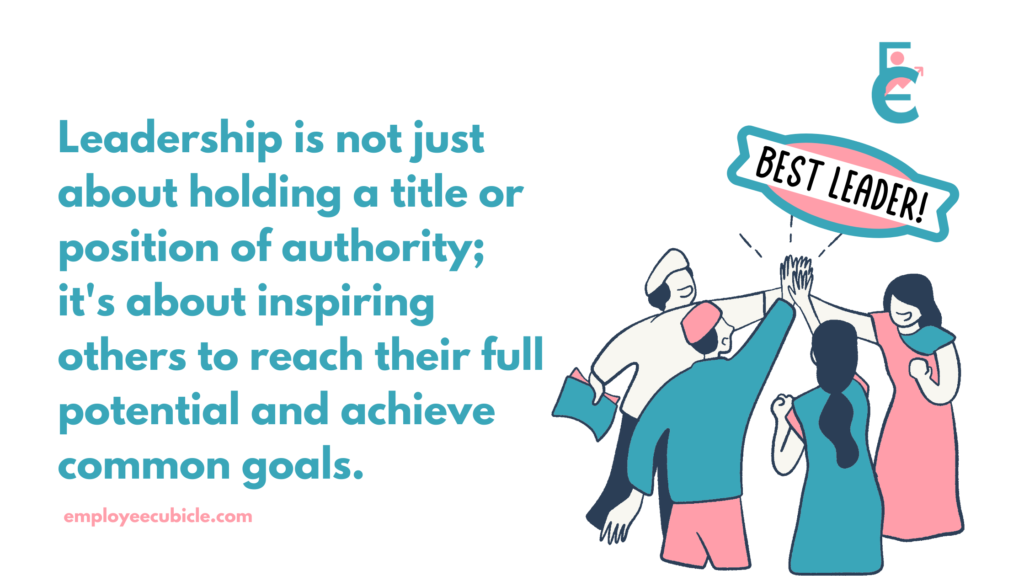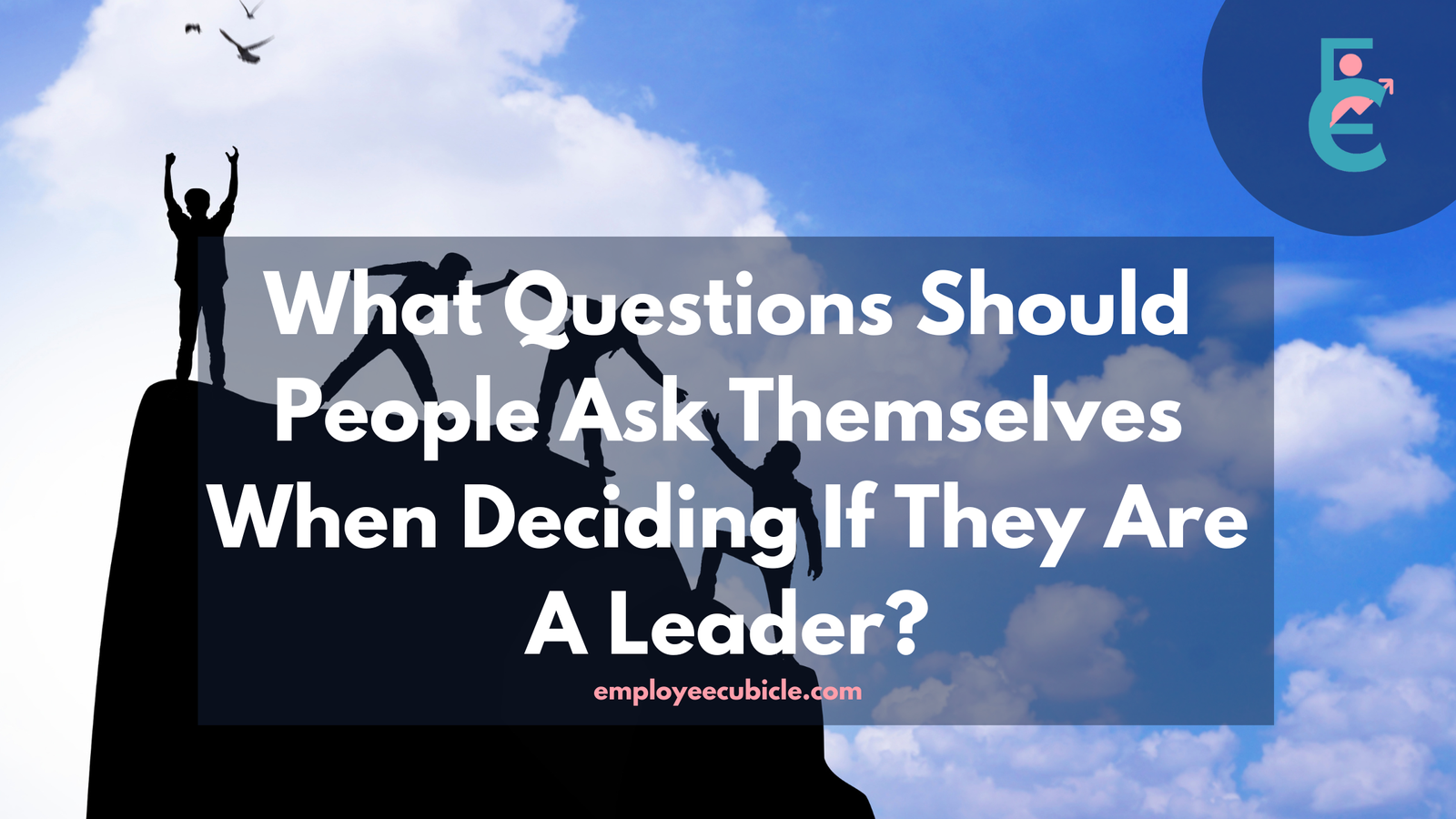Are you ready to embark on a journey of self-discovery and leadership exploration? Have you wonder What Questions Should People Ask Themselves When Deciding If They Are A Leader? In today’s fast-paced world, the ability to lead effectively is more important than ever. As employees and HR professionals, it’s essential to take a moment to pause and reflect on what it truly means to be a leader. By asking ourselves the right questions, we can unlock our leadership potential and make a positive impact in our organizations and communities.
What is Leadership?
Leadership is not just about holding a title or position of authority; it’s about inspiring others to reach their full potential and achieve common goals. As we delve into the concept of leadership, it’s important to consider the various styles and traits that contribute to effective leadership. Whether you’re a seasoned HR professional or a new employee eager to make a difference, understanding what it means to lead is the first step towards personal and professional growth.
What are different types of Leadership Styles and Traits?
Leadership comes in many shapes and forms, and understanding the different styles and traits can help individuals cultivate their own unique leadership approach. Whether you’re a seasoned HR professional or a new employee eager to make a difference, exploring various leadership styles and traits can provide valuable insights into what it takes to be an effective leader in today’s diverse workplaces.
Leadership Styles:
- Authoritative Leadership:
- In this style, the leader sets clear goals and expectations and provides direction to their team.
- Decisions are made centrally, with little input from team members.
- This style works well in situations where quick decisions and a clear direction are needed.
- Democratic Leadership:
- Democratic leaders involve their team members in the decision-making process, soliciting input and feedback from everyone.
- This collaborative approach fosters a sense of ownership and commitment among team members.
- Democratic leadership is effective in environments where creativity and innovation are valued.
- Transformational Leadership:
- Transformational leaders inspire and motivate their team through a shared vision and a compelling sense of purpose.
- They empower their team members to reach their full potential and challenge them to think outside the box.
- This style of leadership is particularly effective in driving organizational change and fostering a culture of continuous improvement.
- Servant Leadership:
- Servant leaders prioritize the needs of their team members above their own, focusing on serving and supporting others.
- They lead by example, demonstrating humility, empathy, and a willingness to listen.
- Servant leadership fosters trust and collaboration, leading to greater employee engagement and satisfaction.
Leadership Traits:
- Communication Skills:
- Effective leaders are skilled communicators who can articulate their vision, listen actively to others, and provide clear feedback.
- They use both verbal and non-verbal communication to convey their message and build rapport with their team.
- Emotional Intelligence:
- Leaders with high emotional intelligence are aware of their own emotions and those of others, allowing them to navigate interpersonal dynamics effectively.
- They demonstrate empathy, self-regulation, and social awareness in their interactions, fostering positive relationships and resolving conflicts constructively.
- Adaptability:
- Successful leaders are adaptable and flexible, able to navigate change and uncertainty with resilience and agility.
- They embrace new ideas and perspectives, continuously learning and evolving to meet the demands of a rapidly changing world.
- Integrity:
- Integrity is a foundational trait of effective leadership, encompassing honesty, transparency, and ethical behavior.
- Leaders who demonstrate integrity earn the trust and respect of their team members, fostering a culture of accountability and integrity within the organization.
What is the Role of Self-awareness in Effective Leadership?
In today’s dynamic and fast-paced work environments, effective leadership is more than just having authority or a title. It requires a deep understanding of oneself and the ability to connect with others on a meaningful level. This is where self-awareness comes into play. Self-aware leaders possess a clear understanding of their own emotions, strengths, weaknesses, and values, which enables them to navigate challenges, inspire others, and drive positive change within their organizations.
Self-aware leaders are better equipped to:
- Understand their impact: By recognizing how their actions and decisions affect those around them, self-aware leaders can make more informed choices that align with their team’s goals and values.
- Leverage strengths: Identifying and leveraging one’s strengths allows leaders to play to their advantages, maximizing their contributions to the team and organization.
- Address weaknesses: Self-awareness enables leaders to acknowledge and address their weaknesses, whether through personal development initiatives or by seeking support from others.
- Foster empathy: Leaders who are in tune with their own emotions are better able to empathize with the experiences and perspectives of their team members, fostering trust, collaboration, and mutual respect.
- Build authenticity: Authentic leadership stems from self-awareness, as leaders who are true to themselves are more likely to inspire trust and loyalty among their colleagues and employees.

What Questions Should People Ask Themselves When Deciding If They Are A Leader?
By asking yourself the right questions, you can gain valuable insights into your leadership potential and identify areas for growth and development. Here are some questions to consider along with their answers:
- What values drive my actions and decisions?
- Answer: My actions and decisions are guided by integrity, honesty, and a commitment to fairness and transparency. I believe in doing what is right, even when it is not the easiest or most popular choice.
- What is my vision for the team or organization, and how can I communicate it effectively?
- Answer: My vision is to create a collaborative and inclusive work environment where every team member feels valued and empowered to contribute their best. I communicate this vision through regular team meetings, one-on-one conversations, and leading by example. I strive to inspire others to share in this vision and work towards common goals.
- Am I a good listener, and do I value diverse perspectives?
- Answer: Yes, I actively listen to my team members and value their diverse perspectives and ideas. I believe that by embracing different viewpoints, we can make better-informed decisions and foster a culture of innovation and creativity. I create opportunities for open dialogue and encourage everyone to speak up and share their thoughts.
- How do I handle conflicts and disagreements within the team?
- Answer: I approach conflicts and disagreements with an open mind and a willingness to find common ground. I encourage respectful communication and collaboration, and I’m not afraid to address issues directly to reach a resolution. I strive to create a safe and supportive environment where conflicts can be addressed constructively and resolved amicably.
- How do I cope with stress and pressure in the workplace?
- Answer: I recognize that stress is a natural part of the workplace, but I prioritize self-care and seek support from my colleagues and mentors when needed. I also practice mindfulness and relaxation techniques to help manage stress effectively. I believe in maintaining a healthy work-life balance and setting boundaries to prevent burnout.
- Am I open to feedback, and do I actively seek opportunities for self-improvement?
- Answer: Yes, I welcome feedback as an opportunity for growth and learning. I actively seek out constructive criticism from my peers, supervisors, and team members, and I use it to continuously improve my skills and performance as a leader. I believe that self-improvement is a lifelong journey, and I am committed to learning and growing every day.
- Can I understand and empathize with the needs and concerns of my team members?
- Answer: Absolutely, I make an effort to understand the unique needs and concerns of each team member and provide support and guidance accordingly. I believe that empathy is essential for building trust and fostering strong relationships within the team. I strive to create a supportive and inclusive environment where everyone feels heard and valued.
- How do I inspire and motivate others to achieve common goals?
- Answer: I lead by example and set high standards for myself, which inspires others to do the same. I recognize and celebrate the achievements of my team members, and I provide encouragement and support to help them reach their full potential. I believe in fostering a culture of collaboration and teamwork, where everyone feels motivated to contribute their best and work towards common goals.
By asking yourself these questions and reflecting on your answers, you can gain valuable insights into your leadership style, strengths, and areas for growth. Remember that leadership is a journey of continuous learning and self-improvement, and by investing in your own development, you can become a more effective and impactful leader in your organization.
Conclusion
As we wrap up our discussion, I encourage you to continue asking yourself these questions regularly. By fostering a mindset of self-reflection and continuous improvement, we can all become better leaders in our workplaces and beyond. Whether you’re an HR professional guiding a team or a new employee stepping into a leadership role, remember that leadership is not defined by a title, but by your actions and willingness to inspire and empower others.
Now, it’s your turn to take action. Share your thoughts and insights on leadership in the comments below or with your colleagues and peers. Together, let’s continue the conversation and inspire each other to become the best leaders we can be.
Remember, leadership is a journey, not a destination. Keep asking yourself the important questions and never stop striving for excellence.
So, what questions will you ask yourself today on your journey to becoming a great leader? Share your thoughts below and let’s inspire each other to reach new heights!



